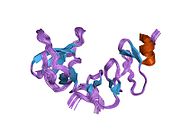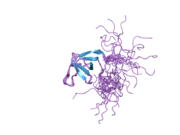NCK2
Cytoplasmic protein NCK2 (also known as NCK-beta and Grb4) is a protein that in humans is encoded by the NCK2 gene.[5][6][7]
Function
[edit]NCK belongs to family of adaptor proteins. There are two mammalian NCK genes, NCK1 and NCK2. NCK1 is located in chromosome 3 and NCK2 is located in chromosome 2. The protein contains three SH3 domains and one SH2 domain. The protein has no known catalytic function but has been shown to bind and recruit various proteins involved in the regulation of receptor protein tyrosine kinases. It is through these regulatory activities that this protein is believed to be involved in cytoskeletal reorganization. Alternate transcriptional splice variants, encoding different isoforms, have been characterized.[7]
Interactions
[edit]NCK2 has been shown to interact with:
References
[edit]- ^ a b c GRCh38: Ensembl release 89: ENSG00000071051 – Ensembl, May 2017
- ^ a b c GRCm38: Ensembl release 89: ENSMUSG00000066877 – Ensembl, May 2017
- ^ "Human PubMed Reference:". National Center for Biotechnology Information, U.S. National Library of Medicine.
- ^ "Mouse PubMed Reference:". National Center for Biotechnology Information, U.S. National Library of Medicine.
- ^ a b c Chen M, She H, Davis EM, Spicer CM, Kim L, Ren R, Le Beau MM, Li W (Sep 1998). "Identification of Nck family genes, chromosomal localization, expression, and signaling specificity". The Journal of Biological Chemistry. 273 (39): 25171–8. doi:10.1074/jbc.273.39.25171. PMID 9737977.
- ^ Liu J, Li M, Ran X, Fan JS, Song J (Jun 2006). "Structural insight into the binding diversity between the human Nck2 SH3 domains and proline-rich proteins". Biochemistry. 45 (23): 7171–84. doi:10.1021/bi060091y. PMID 16752908.
- ^ a b "Entrez Gene: NCK2 NCK adaptor protein 2".
- ^ a b Tu Y, Li F, Wu C (Dec 1998). "Nck-2, a novel Src homology2/3-containing adaptor protein that interacts with the LIM-only protein PINCH and components of growth factor receptor kinase-signaling pathways". Molecular Biology of the Cell. 9 (12): 3367–82. doi:10.1091/mbc.9.12.3367. PMC 25640. PMID 9843575.
- ^ a b Braverman LE, Quilliam LA (Feb 1999). "Identification of Grb4/Nckbeta, a src homology 2 and 3 domain-containing adapter protein having similar binding and biological properties to Nck". The Journal of Biological Chemistry. 274 (9): 5542–9. doi:10.1074/jbc.274.9.5542. PMID 10026169.
- ^ Tu Y, Li F, Goicoechea S, Wu C (Mar 1999). "The LIM-only protein PINCH directly interacts with integrin-linked kinase and is recruited to integrin-rich sites in spreading cells". Molecular and Cellular Biology. 19 (3): 2425–34. doi:10.1128/mcb.19.3.2425. PMC 84035. PMID 10022929.
- ^ Chen M, She H, Kim A, Woodley DT, Li W (Nov 2000). "Nckbeta adapter regulates actin polymerization in NIH 3T3 fibroblasts in response to platelet-derived growth factor bb". Molecular and Cellular Biology. 20 (21): 7867–80. doi:10.1128/mcb.20.21.7867-7880.2000. PMC 86398. PMID 11027258.
- ^ Goicoechea SM, Tu Y, Hua Y, Chen K, Shen TL, Guan JL, Wu C (Jul 2002). "Nck-2 interacts with focal adhesion kinase and modulates cell motility". The International Journal of Biochemistry & Cell Biology. 34 (7): 791–805. doi:10.1016/s1357-2725(02)00002-x. PMID 11950595.
- ^ Gil D, Schamel WW, Montoya M, Sánchez-Madrid F, Alarcón B (Jun 2002). "Recruitment of Nck by CD3 epsilon reveals a ligand-induced conformational change essential for T cell receptor signaling and synapse formation". Cell. 109 (7): 901–12. doi:10.1016/S0092-8674(02)00799-7. PMID 12110186. S2CID 2714623.
- ^ Suzuki S, Mizutani M, Suzuki K, Yamada M, Kojima M, Hatanaka H, Koizumi S (Jun 2002). "Brain-derived neurotrophic factor promotes interaction of the Nck2 adaptor protein with the TrkB tyrosine kinase receptor". Biochemical and Biophysical Research Communications. 294 (5): 1087–92. doi:10.1016/S0006-291X(02)00606-X. PMID 12074588.
Further reading
[edit]- Li W, Hu P, Skolnik EY, Ullrich A, Schlessinger J (Dec 1992). "The SH2 and SH3 domain-containing Nck protein is oncogenic and a common target for phosphorylation by different surface receptors". Molecular and Cellular Biology. 12 (12): 5824–33. doi:10.1128/MCB.12.12.5824. PMC 360522. PMID 1333047.
- Tu Y, Li F, Wu C (Dec 1998). "Nck-2, a novel Src homology2/3-containing adaptor protein that interacts with the LIM-only protein PINCH and components of growth factor receptor kinase-signaling pathways". Molecular Biology of the Cell. 9 (12): 3367–82. doi:10.1091/mbc.9.12.3367. PMC 25640. PMID 9843575.
- Tu Y, Li F, Goicoechea S, Wu C (Mar 1999). "The LIM-only protein PINCH directly interacts with integrin-linked kinase and is recruited to integrin-rich sites in spreading cells". Molecular and Cellular Biology. 19 (3): 2425–34. doi:10.1128/mcb.19.3.2425. PMC 84035. PMID 10022929.
- Braverman LE, Quilliam LA (Feb 1999). "Identification of Grb4/Nckbeta, a src homology 2 and 3 domain-containing adapter protein having similar binding and biological properties to Nck". The Journal of Biological Chemistry. 274 (9): 5542–9. doi:10.1074/jbc.274.9.5542. PMID 10026169.
- Coutinho S, Jahn T, Lewitzky M, Feller S, Hutzler P, Peschel C, Duyster J (Jul 2000). "Characterization of Ggrb4, an adapter protein interacting with Bcr-Abl". Blood. 96 (2): 618–24. doi:10.1182/blood.V96.2.618. PMID 10887126.
- Chen M, She H, Kim A, Woodley DT, Li W (Nov 2000). "Nckbeta adapter regulates actin polymerization in NIH 3T3 fibroblasts in response to platelet-derived growth factor bb". Molecular and Cellular Biology. 20 (21): 7867–80. doi:10.1128/MCB.20.21.7867-7880.2000. PMC 86398. PMID 11027258.
- Tu Y, Kucik DF, Wu C (Mar 2001). "Identification and kinetic analysis of the interaction between Nck-2 and DOCK180". FEBS Letters. 491 (3): 193–9. doi:10.1016/S0014-5793(01)02195-0. PMID 11240126. S2CID 31372015.
- Jahn T, Seipel P, Coutinho S, Miething C, Peschel C, Duyster J (Nov 2001). "Grb4/Nckbeta acts as a nuclear repressor of v-Abl-induced transcription from c-jun/c-fos promoter elements". The Journal of Biological Chemistry. 276 (46): 43419–27. doi:10.1074/jbc.M107030200. PMID 11514578.
- Cowan CA, Henkemeyer M (Sep 2001). "The SH2/SH3 adaptor Grb4 transduces B-ephrin reverse signals". Nature. 413 (6852): 174–9. Bibcode:2001Natur.413..174C. doi:10.1038/35093123. PMID 11557983. S2CID 4313061.
- Goicoechea SM, Tu Y, Hua Y, Chen K, Shen TL, Guan JL, Wu C (Jul 2002). "Nck-2 interacts with focal adhesion kinase and modulates cell motility". The International Journal of Biochemistry & Cell Biology. 34 (7): 791–805. doi:10.1016/S1357-2725(02)00002-X. PMID 11950595.
- Suzuki S, Mizutani M, Suzuki K, Yamada M, Kojima M, Hatanaka H, Koizumi S (Jun 2002). "Brain-derived neurotrophic factor promotes interaction of the Nck2 adaptor protein with the TrkB tyrosine kinase receptor". Biochemical and Biophysical Research Communications. 294 (5): 1087–92. doi:10.1016/S0006-291X(02)00606-X. PMID 12074588.
- Gil D, Schamel WW, Montoya M, Sánchez-Madrid F, Alarcón B (Jun 2002). "Recruitment of Nck by CD3 epsilon reveals a ligand-induced conformational change essential for T cell receptor signaling and synapse formation". Cell. 109 (7): 901–12. doi:10.1016/S0092-8674(02)00799-7. PMID 12110186. S2CID 2714623.
- Song J, Vranken W, Xu P, Gingras R, Noyce RS, Yu Z, Shen SH, Ni F (Sep 2002). "Solution structure and backbone dynamics of the functional cytoplasmic subdomain of human ephrin B2, a cell-surface ligand with bidirectional signaling properties". Biochemistry. 41 (36): 10942–9. doi:10.1021/bi025815u. PMID 12206665.
- Aspenström P (Sep 2002). "The WASP-binding protein WIRE has a role in the regulation of the actin filament system downstream of the platelet-derived growth factor receptor". Experimental Cell Research. 279 (1): 21–33. doi:10.1006/excr.2002.5576. PMID 12213210.
- Hafizi S, Alindri F, Karlsson R, Dahlbäck B (Dec 2002). "Interaction of Axl receptor tyrosine kinase with C1-TEN, a novel C1 domain-containing protein with homology to tensin". Biochemical and Biophysical Research Communications. 299 (5): 793–800. doi:10.1016/S0006-291X(02)02718-3. PMID 12470648.
- Velyvis A, Vaynberg J, Yang Y, Vinogradova O, Zhang Y, Wu C, Qin J (Jul 2003). "Structural and functional insights into PINCH LIM4 domain-mediated integrin signaling". Nature Structural Biology. 10 (7): 558–64. doi:10.1038/nsb938. PMID 12794636. S2CID 175531.
- Hu Y, Fang X, Dunham SM, Prada C, Stachowiak EK, Stachowiak MK (Jul 2004). "90-kDa ribosomal S6 kinase is a direct target for the nuclear fibroblast growth factor receptor 1 (FGFR1): role in FGFR1 signaling". The Journal of Biological Chemistry. 279 (28): 29325–35. doi:10.1074/jbc.M311144200. PMID 15117958.
- Ran X, Song J (May 2005). "Structural insight into the binding diversity between the Tyr-phosphorylated human ephrinBs and Nck2 SH2 domain". The Journal of Biological Chemistry. 280 (19): 19205–12. doi:10.1074/jbc.M500330200. PMID 15764601.
- Song J (Jul 2003). "Tyrosine phosphorylation of the well packed ephrinB cytoplasmic beta-hairpin for reverse signaling. Structural consequences and binding properties". The Journal of Biological Chemistry. 278 (27): 24714–20. doi:10.1074/jbc.M210625200. PMID 12606549.
- Liu Z, Guo X, Jiang Y, Zhang H (2013). "NCK2 is significantly associated with opiates addiction in African-origin men". TheScientificWorldJournal. 2013: 748979. doi:10.1155/2013/748979. PMC 3603435. PMID 23533358.
External links
[edit]- Nck2 Info with links in the Cell Migration Gateway Archived 2014-12-11 at the Wayback Machine












